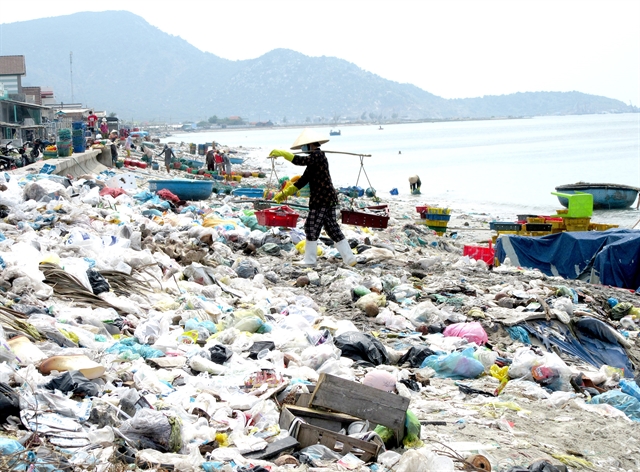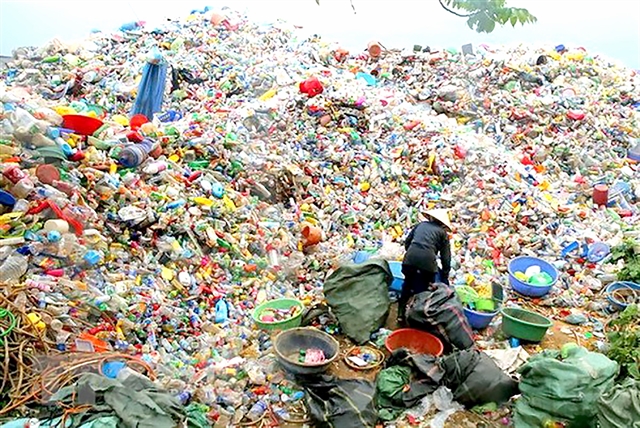 Society
Society

 |
Plastic waste covers a beach in Phước Diêm, Thuận Nam District in the coastal province of Ninh Thuận. VNA/VNS Photo Nguyễn Thành
HÀ NỘI — Việt Nam is considered to be one of the major plastic polluters in the world, discharging about 3.1 million tonnes of plastic waste every year, including 0.28-0.73 million tonnes of plastic waste discharged into the ocean.
The data has been revealed this week in a World Banks' report Vietnam: Plastic Pollution Diagnostics. The report was conducted from July 2020 to April 2021 to deepen knowledge about the different plastic waste types leaking into rivers and oceans in Việt Nam and identify market alternatives for potential substitution.
The report said plastic waste was by far the most abundant type of waste collected in the field surveys along riverbanks and coastal sites, accounting for around 94 per cent of the number of items and 71 per cent by weight.
Take-away food packaging waste was the most abundant source of plastic waste found in the field surveys (44 per cent in number), followed by fisheries-related waste (33 per cent in number), and household-related waste (22 per cent in number).
Single-use plastic (SUP) items accounted for 72 per cent (in number) of the total plastic waste identified at riverbanks and 52 per cent (in number) of the total plastic waste identified at coastal sites in the field surveys, the report said.
Plastic bags and their fragments are the most common single-use items found in the survey locations. Styrofoam food containers are among the top five items in both river and coastal locations. Fishing gear was very prevalent, accounting for around 30 per cent of plastic waste in number.
According to the report, the situation is expected to worsen as urbanisation, together with strong economic and population growth, results in rapidly increasing volumes of domestic waste. By 2030, in fewer than 15 years, Việt Nam’s waste generation is expected to double from 27 million to 54 million tonnes.
It is estimated that 177 million plastic items are embedded in Việt Nam’s reefs by 2025. These threats cause coral disease and a decrease in mangrove cover, which, in turn, causes greater flooding in coastal communities, as well as water-borne diseases. Plastic pollution is especially a problem for families that are dependent on fisheries and tourism.
 |
A worker at a site collecting plastic waste for recycling in the northern mountainous province of Lào Cai. VNA/VNS Photo Ngọc Hà
Causes and solutions
The rapid rise of plastic imports, production and use in Việt Nam, as well as mismanaged waste, has resulted in a country-wide crisis of plastic pollution; something that 55 per cent of consumers consider to be a serious problem, according to another World Bank report, 'Toward a National Single-use Plastics Roadmap in Việt Nam'.
One of the solutions is to replace the leading polluting plastics, which promotes reusable non-plastic items to reduce overall plastic waste generation.
Other recommendations include restrictions on the distribution of SUP straws and drink stirrers; restrictions on the use of certain SUPs for on-site consumption in food establishments; restrictions on the use of plastic disposable cutlery by online food delivery providers; restrictions on the distribution of SUP toiletry products in hotels and restrictions on the use of certain SUPs in tourist establishments and areas.
One suggestion is to charge consumers for non-biodegradable plastic bags and takeaway coffee cups from 2026.
It also proposes several types of bans to reduce plastic waste.
The first type is a ban on the sale and distribution of certain SUPs and their placement in the market, but not banning production and exports.
The second type is a full ban on the production, imports, sales, and distribution of SUPs. It is the strongest type of legislation, and would eliminate the targeted SUPs, the report said.
The proposal consists of market bans on plastic straws and drink stirrers; non-degradable plastic bags; and EPS food containers.
Việt Nam’s efforts
The Government of Việt Nam has set ambitious targets for reducing marine plastic litter. In its National Action Plan for Management of Marine Plastic Litter by 2030, Việt Nam’s Government committed to cutting marine plastic litter by 50 and 75 per cent, respectively, by 2025 and 2030.
To reach these targets, the Government recently introduced several laws, circulars and decrees to tackle SUPs, which are a major source of plastic litter.
Most recently, Decree No 8/2022, which concerns the implementation of a selection of articles in the Law on Environmental Protection 2020, set targets for January 1, 2026, to stop the production for domestic consumption, as well as imports of non-biodegradable plastic bags that are smaller than 50cm x 50cm, and have a thickness of fewer than 50 μm.
The decree also requires a gradual reduction of the production and imports of other SUPs, until all are banned in 2031.
In addition, the decree directs provincial People’s Committees to restrict the distribution and use of SUPs in commercial centres, supermarkets, hotels, and tourism areas, starting in 2025.
Nguyễn Quế Lâm, Deputy Director of the Việt Nam Administration of Seas and Islands, under the Ministry of Natural Resources and Environment, said on August 16, 2021, Prime Minister Phạm Minh Chính issued Decision No 1407/QĐ-TTg, approving the project that Việt Nam actively prepares and participates in a global treaty on ocean plastic pollution.
In September 2021, Việt Nam, along with Germany, Ecuador and Ghana, co-hosted the Ministerial Conference on Plastic Pollution and Ocean Waste to build momentum to tackle the problem of plastic pollution and marine litter that has been generated by many previous international discussions. Việt Nam also pointed out specific proposals to address the problem at the conference and planned to present them at the fifth session of the United Nations Environment Assembly (UNEA-5.2), he said.
One of the remarkable outcomes of the conference was that 76 countries, including Việt Nam, adopted the Ministerial Declaration to build political momentum and will to promote a coherent global strategy to address the problem of plastic pollution and ocean waste, he said. — VNS




